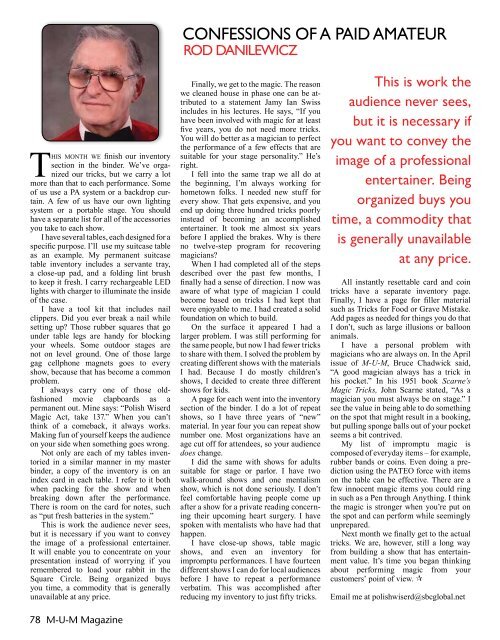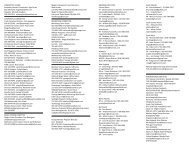(Hank) Moorehouse 1934 – 2011 - The Society of American Magicians
(Hank) Moorehouse 1934 – 2011 - The Society of American Magicians
(Hank) Moorehouse 1934 – 2011 - The Society of American Magicians
You also want an ePaper? Increase the reach of your titles
YUMPU automatically turns print PDFs into web optimized ePapers that Google loves.
This monTh we finish our inventory<br />
section in the binder. We’ve organized<br />
our tricks, but we carry a lot<br />
more than that to each performance. Some<br />
<strong>of</strong> us use a PA system or a backdrop curtain.<br />
A few <strong>of</strong> us have our own lighting<br />
system or a portable stage. You should<br />
have a separate list for all <strong>of</strong> the accessories<br />
you take to each show.<br />
I have several tables, each designed for a<br />
specific purpose. I’ll use my suitcase table<br />
as an example. My permanent suitcase<br />
table inventory includes a servante tray,<br />
a close-up pad, and a folding lint brush<br />
to keep it fresh. I carry rechargeable LED<br />
lights with charger to illuminate the inside<br />
<strong>of</strong> the case.<br />
I have a tool kit that includes nail<br />
clippers. Did you ever break a nail while<br />
setting up? Those rubber squares that go<br />
under table legs are handy for blocking<br />
your wheels. Some outdoor stages are<br />
not on level ground. One <strong>of</strong> those large<br />
gag cellphone magnets goes to every<br />
show, because that has become a common<br />
problem.<br />
I always carry one <strong>of</strong> those oldfashioned<br />
movie clapboards as a<br />
permanent out. Mine says: “Polish Wiserd<br />
Magic Act, take 137.” When you can’t<br />
think <strong>of</strong> a comeback, it always works.<br />
Making fun <strong>of</strong> yourself keeps the audience<br />
on your side when something goes wrong.<br />
Not only are each <strong>of</strong> my tables inventoried<br />
in a similar manner in my master<br />
binder, a copy <strong>of</strong> the inventory is on an<br />
index card in each table. I refer to it both<br />
when packing for the show and when<br />
breaking down after the performance.<br />
<strong>The</strong>re is room on the card for notes, such<br />
as “put fresh batteries in the system.”<br />
This is work the audience never sees,<br />
but it is necessary if you want to convey<br />
the image <strong>of</strong> a pr<strong>of</strong>essional entertainer.<br />
It will enable you to concentrate on your<br />
presentation instead <strong>of</strong> worrying if you<br />
remembered to load your rabbit in the<br />
Square Circle. Being organized buys<br />
you time, a commodity that is generally<br />
unavailable at any price.<br />
78 M-U-M Magazine<br />
CONFESSIONS OF A PAID AMATEUR<br />
ROD DANILEWICZ<br />
Finally, we get to the magic. <strong>The</strong> reason<br />
we cleaned house in phase one can be attributed<br />
to a statement Jamy Ian Swiss<br />
includes in his lectures. He says, “If you<br />
have been involved with magic for at least<br />
five years, you do not need more tricks.<br />
You will do better as a magician to perfect<br />
the performance <strong>of</strong> a few effects that are<br />
suitable for your stage personality.” He’s<br />
right.<br />
I fell into the same trap we all do at<br />
the beginning, I’m always working for<br />
hometown folks. I needed new stuff for<br />
every show. That gets expensive, and you<br />
end up doing three hundred tricks poorly<br />
instead <strong>of</strong> becoming an accomplished<br />
entertainer. It took me almost six years<br />
before I applied the brakes. Why is there<br />
no twelve-step program for recovering<br />
magicians?<br />
When I had completed all <strong>of</strong> the steps<br />
described over the past few months, I<br />
finally had a sense <strong>of</strong> direction. I now was<br />
aware <strong>of</strong> what type <strong>of</strong> magician I could<br />
become based on tricks I had kept that<br />
were enjoyable to me. I had created a solid<br />
foundation on which to build.<br />
On the surface it appeared I had a<br />
larger problem. I was still performing for<br />
the same people, but now I had fewer tricks<br />
to share with them. I solved the problem by<br />
creating different shows with the materials<br />
I had. Because I do mostly children’s<br />
shows, I decided to create three different<br />
shows for kids.<br />
A page for each went into the inventory<br />
section <strong>of</strong> the binder. I do a lot <strong>of</strong> repeat<br />
shows, so I have three years <strong>of</strong> “new”<br />
material. In year four you can repeat show<br />
number one. Most organizations have an<br />
age cut <strong>of</strong>f for attendees, so your audience<br />
does change.<br />
I did the same with shows for adults<br />
suitable for stage or parlor. I have two<br />
walk-around shows and one mentalism<br />
show, which is not done seriously. I don’t<br />
feel comfortable having people come up<br />
after a show for a private reading concerning<br />
their upcoming heart surgery. I have<br />
spoken with mentalists who have had that<br />
happen.<br />
I have close-up shows, table magic<br />
shows, and even an inventory for<br />
impromptu performances. I have fourteen<br />
different shows I can do for local audiences<br />
before I have to repeat a performance<br />
verbatim. This was accomplished after<br />
reducing my inventory to just fifty tricks.<br />
This is work the<br />
audience never sees,<br />
but it is necessary if<br />
you want to convey the<br />
image <strong>of</strong> a pr<strong>of</strong>essional<br />
entertainer. Being<br />
organized buys you<br />
time, a commodity that<br />
is generally unavailable<br />
at any price.<br />
All instantly resettable card and coin<br />
tricks have a separate inventory page.<br />
Finally, I have a page for filler material<br />
such as Tricks for Food or Grave Mistake.<br />
Add pages as needed for things you do that<br />
I don’t, such as large illusions or balloon<br />
animals.<br />
I have a personal problem with<br />
magicians who are always on. In the April<br />
issue <strong>of</strong> M-U-M, Bruce Chadwick said,<br />
“A good magician always has a trick in<br />
his pocket.” In his 1951 book Scarne’s<br />
Magic Tricks, John Scarne stated, “As a<br />
magician you must always be on stage.” I<br />
see the value in being able to do something<br />
on the spot that might result in a booking,<br />
but pulling sponge balls out <strong>of</strong> your pocket<br />
seems a bit contrived.<br />
My list <strong>of</strong> impromptu magic is<br />
composed <strong>of</strong> everyday items <strong>–</strong> for example,<br />
rubber bands or coins. Even doing a prediction<br />
using the PATEO force with items<br />
on the table can be effective. <strong>The</strong>re are a<br />
few innocent magic items you could ring<br />
in such as a Pen through Anything. I think<br />
the magic is stronger when you’re put on<br />
the spot and can perform while seemingly<br />
unprepared.<br />
Next month we finally get to the actual<br />
tricks. We are, however, still a long way<br />
from building a show that has entertainment<br />
value. It’s time you began thinking<br />
about performing magic from your<br />
customers’ point <strong>of</strong> view. �<br />
Email me at polishwiserd@sbcglobal.net



